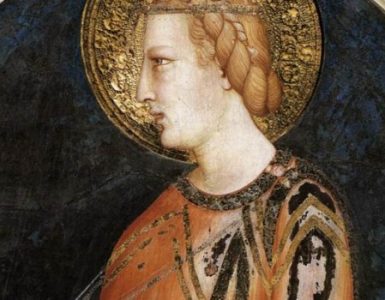When Jesus heals a deaf, mute man, He fulfills an old prophecy in a startling, unexpected way. How?
Gospel (Read Mk 7:31-37)
St. Mark describes for us an episode that took place while Jesus was ministering in a primarily Gentile region (the Decapolis). “People brought to Him a deaf man who had a speech impediment and begged Him to lay His hand on him.” We don’t know if these were Jews or Gentiles, but we do know that this was an earnest intercession for a needy person. Because so much of our own prayer lives, as well as that of the whole Church, is taken up with intercessions of exactly this sort, we would do well to pay careful attention to the outcome.
Interestingly, Jesus takes the man who lived entirely in silence “off by himself away from the crowd.” Why did He want this to be such a personal encounter? Perhaps He wanted to avoid the heightened excitement of the crowd. Perhaps He wanted the man to remember His own healing touch more than the miracle of being able to hear and speak.
Look at how personal and physical Jesus gets with the man. He puts “His finger into the man’s ears.” Those familiar with Jewish history will know that sometimes God’s action in the world was described in terms of His “finger” (see Ex 8:19; 31:18; Ps 8:4; also see Lk 11:20). Then, “spitting, [He] touched his tongue.” What intimate contact this is! It placed something of Jesus’ Body, His spittle, into the man’s mouth. When we see how physical this act of healing becomes, we have some sense of appreciation that, in the Eucharist, Jesus still desires to heal us by actually coming into our bodies.
Then, “He looked up to heaven and groaned, and said to him…‘Be opened’” (translated from Aramaic by St. Mark)! What was the glance to heaven and the groaning all about? Was it a foreshadowing, in Jesus’ own Body, of the Passion He would soon undergo in order for this man to be healed not just of deafness but of sin and death as well? Did the glance to His Father signal a communion of love as the Son worked to perfectly fulfill the Father’s mission? As we shall see in our first reading, long ago the prophets had spoken of a Messiah who would clear the ears of the deaf. Was Jesus’ groan one of both the ecstasy of His obedient love for His Father and acknowledgement of its high cost?
The man was immediately cured, but Jesus ordered everyone to keep quiet about it. Surely this was to avoid mass hysteria and sensationalism from spreading through the towns and villages where He traveled. In addition, Jesus didn’t want news about Him to travel too quickly to Jerusalem, triggering the fierce resistance He knew would come. He wanted time to do His work of preaching and teaching. He also wanted followers who were sincere, ready to follow Him even when He didn’t lift a single one of His powerful “fingers” to stop the Jews from arresting Him and the Romans from killing Him.
The warning didn’t work. In fact, it had the opposite effect. “The more He ordered them not to [talk about it], the more they proclaimed it.” Perhaps His urgency over secrecy convinced them the message about Him really was very important. In any case, the people were “exceedingly astonished” by the miracle and said, “He has done all things well.”
Their commentary reminds us of the constant refrain of the Creation story, when God repeatedly pronounced His handiwork to be “good.” This is appropriate, because as Jesus takes up the miraculous work of fulfilling all the prophecies about a Messiah who would heal God’s people, He begins the work of re-Creation, in which He aims to heal not simply physical infirmities but everything that keeps us deaf and blind to God, that cripples us in our walk with Him, and that prevents our tongues from singing a continual song of praise to Him.
Possible response: Lord Jesus, only “say the word, and my soul shall be healed.”
First Reading (Read Isa 35:4-7a)
Here are the words of Isaiah that help us understand the great significance of our Gospel story. At a time in Israel’s history when God had to send severe punishment on their waywardness, He also made a wonderful promise: “Say to those whose hearts are frightened…‘Here is your God.’”
The One about whom Isaiah prophesied would be the very presence of God in the midst of His people. What would He be doing as He saved them? “Then will the eyes of the blind be opened, the ears of the deaf be cleared…then the tongues of the mute will sing.” Jesus used the miracles of physical healing (seen by all eyes) to point to the true and eternal healing He came to give us (seen only by God’s eyes).
Isaiah goes on to describe this visitation by God as a time when the dried-out, thirsty earth will itself erupt in streams, rivers, pools, and springs. He is not, of course, talking about changing geography or climate. No, He is seeing a day when the curse that fell on both man and Creation at the time of the Fall will come to an end. The deterioration and death that has been the constant shadow on the whole universe (see Rom 8:22) will finally be banished once and for all. Everything God made—all of which in its own way longs for Him in a never-quenched thirst—will be given new life. Isaiah assures us that the Messiah will make good on this glorious promise. If we believe his words, then we can do what God tells us through him: “Be strong, fear not!”
Possible response: Heavenly Father, thank You that You have already begun to fulfill Your promise of healing Your Creation. Help me be strong and fearless in the times when I struggle to see it.
Psalm (Read Ps 146:8-10)
Perhaps the people in our Gospel story who just couldn’t keep quiet about Jesus would have wanted to use the words of this psalm to express their great astonishment over Him. It is a song praising God’s goodness in setting captives free, in administering justice, in caring for all those sick or burdened or lost. To perceive God at work this way—then, in the psalmist’s day, or now, in our own—leaves us with only this response: “Praise the Lord, my soul!”
Possible response: The psalm is, itself, a response to our other readings. Read it again prayerfully to make it your own.
Second Reading (Read Jam 2:1-5)
St. James now gives us practical direction in how to live our lives in imitation of Christ. We have seen from our other readings that God cares for the lost, the outcast, the marginalized, the sick, the weak, and the helpless. Now, as we live our lives in Christ, we are to do the same. St. James gives us an example of what that kind of life looks like. In our “assembly,” or church gathering, we are to show “no partiality” by treating the well-to-do better and more hospitably than the shabby. In fact, we are to associate with the “poor in the world” to help us remember that we are the “poor” God has chosen “to be rich in faith and heirs of the kingdom that He promised to those who love Him.”
We should always be attentive to the lessons the poor can teach us.
Possible response: Lord Jesus, please help me combat the temptation to show partiality. Help me be as gracious to the poor as You are to me
Breenbergh, B. (1635). Christ healing the deaf mute of Decapolis [painting]. Retrieved from Wikipedia.










